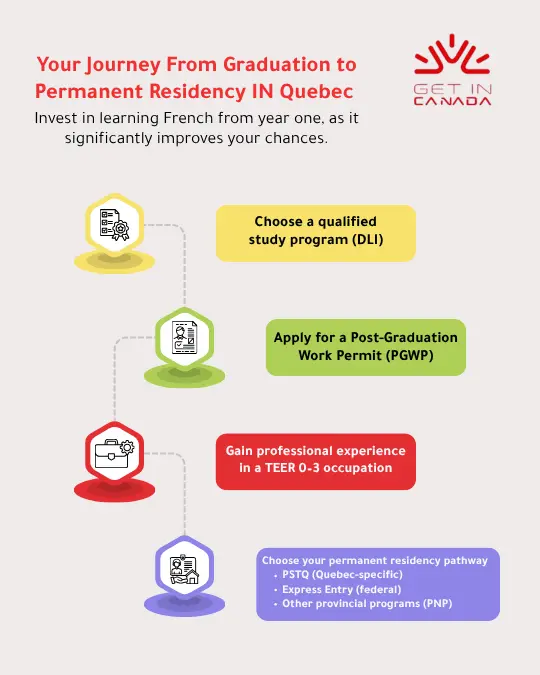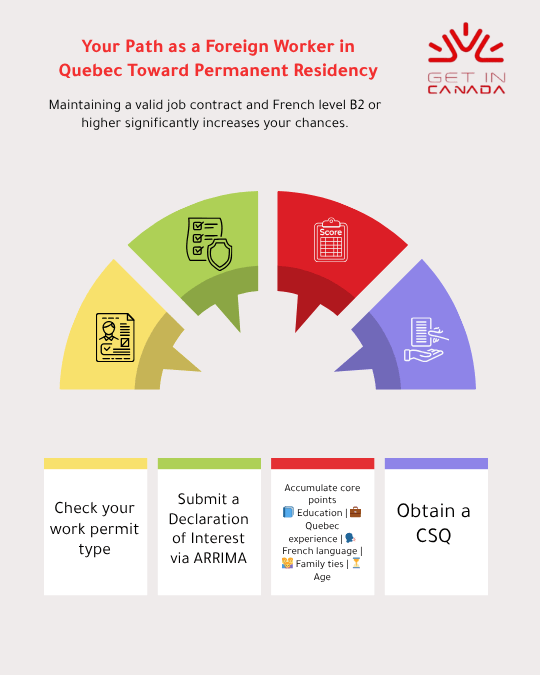Your Guide to Quebec Permanent Residency After PEQ cancellation

Quebec has undergone major changes in its economic immigration policies during 2024 and 2025. The government has stopped accepting new applications under the PEQ Étudiant and PEQ Travailleur programs, which were among the most popular pathways to permanent residency for international students and foreign workers.
The previous system has been replaced by a more selective program called the Programme de Sélection des Travailleurs Québécois (PSTQ), with the province prioritizing French-speaking individuals and those with experience or education within Quebec.
These changes directly impact the future of thousands of students and foreign workers. This guide aims to clarify the legal pathways currently available and provide expert tips to avoid mistakes and plan a smart route toward permanent residency.
Is PEQ program suspended?
Yes, the PEQ (Programme de l’expérience québécoise) has been suspended for new applications. Both streams—the Graduate (Étudiant) and Temporary Foreign Worker (Travailleur) streams—are no longer accepting new applications. Applications submitted before the deadline will still be processed, but going forward, Quebec is focusing on the new Programme de Sélection des Travailleurs Québécois (PSTQ) as the main pathway for skilled workers and international graduates seeking permanent residency.
These changes reflect Quebec’s shift in economic immigration policy, focusing more on the French language and local integration.
| Item | Current Status |
| PEQ – Étudiant | New applications stopped as of October 31, 2024 |
| PEQ – Travailleur | Frozen until November 30, 2025 |
| PSTQ Launch | Effective November 29, 2024, replacing PRTQ |
| Focus on Francophones | ≥ 70% of economic immigrants must speak French |
| Using ARRIMA in PSTQ | Submit a Déclaration d’Intérêt via Arrima |
Guide for International Students in Quebec

Quebec remains a prime destination for international students, but after the PEQ cancellation, understanding the new alternatives and legal requirements is essential.
1. Choosing the Right Study Program
Start your educational journey by selecting a recognized institution under DLI and a program that qualifies for PGWP. Check IRCC’s official list of eligible institutions to confirm program validity.
2. Post-Graduation – Work Permit (PGWP)
A PGWP allows you to gain Canadian experience that qualifies you for permanent residency. You can get a work permit of up to 3 years, developing experience in TEER 0–3 jobs to become eligible for PSTQ or Express Entry.
3. Alternative Pathways After PEQ Cancellation
| Pathway | Basic Requirements | Language | Advantage |
| PSTQ | Residence, work, or study in Quebec + Arrima profile | French level 7+ | Priority for Quebec residents |
| Express Entry – CEC | 1 year Canadian experience | English or French | Faster federal processing |
| Express Entry – Francophone | B2 French | French only | Significant extra points |
| PNP – Other provinces | Job offer outside Quebec | Depends on province | Strong alternative |
4. Required Documents for PSTQ
Proper documentation is essential for a successful application:
- Graduation certificate & Completion Letter
- Transcripts
- PGWP
- Language proof (TEF or TCF)
- Job offer letter (if applicable)
- Proof of residence in Quebec
5. Legal Tips for Students planning to stay in Quebec :
- Plan early and invest in French from the start.
- Do not rely on the former PEQ as a guaranteed path.
- Regularly check the Arrima platform, as invitations are selective.
- Do not leave Canada before securing your post-graduation legal status.
Guide for Foreign Workers in Quebec

Recent changes have shifted worker pathways toward permanent residency, requiring clear understanding of the new permit system and PSTQ criteria.
1. Types of Work Permits in Quebec
There are two types of Work permits in Quebec, these include:
- Employer-specific (LMIA-based)
- LMIA-exempt (ICT, C11, Mobilité Francophone)
2. Moving Toward Permanent Residency via PSTQ
PSTQ is the main new pathway for foreign workers in Quebec, based on points and ranking. Submit a Déclaration d’intérêt via Arrima and accumulate points based on:
- Education
- Quebec work experience
- French proficiency
- Age
- Family ties in Quebec
Once invited (Invitation à présenter une demande), you receive a CSQ and then apply for permanent residency via IRCC.
3. Advanced Tips for Workers
- Focus on French proficiency and maintain legal status while working.
- Keep an active employment contract during application.
- Develop French skills (B2 or C1).
- Use Mobilité francophone programs if outside Quebec but seeking relocation.
Legal Analysis and Professional Commentary on the Immigration system in Quebec
These changes represent a shift from a fast-track immigration model to a more selective system, focusing on integration and cultural identity in Quebec. Legally, the decision does not violate the constitution, as provinces have the authority to manage economic immigration.
The federal government may intervene if these policies affect labor market balance or interprovincial mobility agreements. Practically, students and foreign workers must demonstrate real integration—through study, work experience, and language proficiency—before applying for permanent residency.
Practical Recommendations form an Immigration consultant in Quebec
These steps help prioritize actions by category and prevent losing available legal opportunities.
| Category | Immediate Step | Short Term | Long Term |
| Current Students | Ensure PGWP eligibility & learn French | Apply via PSTQ or CEC | Develop experience in Quebec |
| New Students | Choose DLI eligible for PGWP | Start learning French before arrival | Consult immigration lawyer for residency planning |
| Current Workers | Review work permit type and conditions | Improve French proficiency | Prepare PSTQ file before contract ends |











